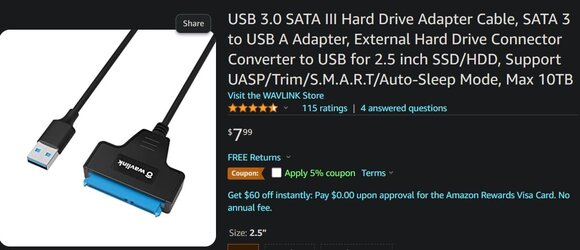That's a very compelling thought.
You could say the same thing about any external drive. If anything, a USB connector is easier to accidentally dislodge than a SATA+power connector. Listen, when backing up to external drives, the best practice is to unplug them when not in use and store them in a safe, hidden place. The former guards against wear/tear and ransomware, while the latter guards a little against thieves. If you're really serious, you'll do as I mentioned earlier and store a second set off-site and rotate with the at-home set on a regular basis. This further guards against thieves and also catastrophes like fire, flooding etc that could befall your home.
One of the nice things about using bare 3.5" drives is that I can fit six in a standard small safe deposit box at my bank. You're not going to be doing that with external enclosures. About the cable you posted, as I mentioned earlier, it won't provide enough power for a 3.5" drive. Unless you're planning on using 2.5" drives or an SSD, I highly recommend buying a dock, preferably a dual dock. A drive in a dock in its fixed location is a bit more robust in use than a bare hard drive sitting randomly on your desk.
As for reliability concerns, I've been using bare 3.5" hard drives for 15+ years with docks to backup (currently) 20 TB of data, and guess what, I've never accidentally dislodged a cable or lost data. I'd bet most people don't maintain a hash database and check against it at least a couple of times a year, either, in addition to checking after migrating to new hard drives. Just store them in their anti-static bags as I mentioned earlier, and hide them away in a drawer or cabinet, or keep them in a padded laptop bag or similar in case you have to bug out, which is what I do, and it also makes it easier to transport the sets when rotating them.







